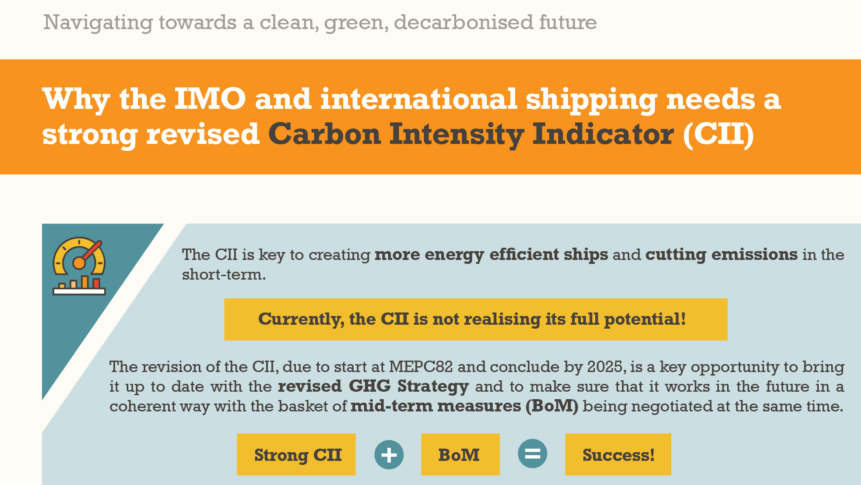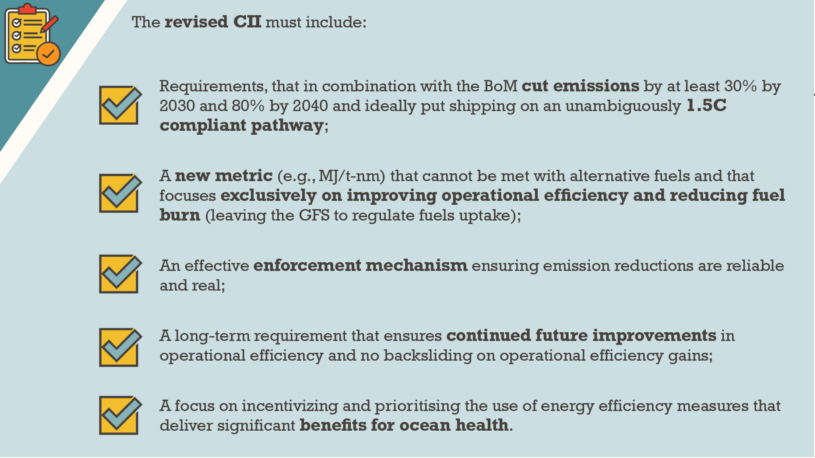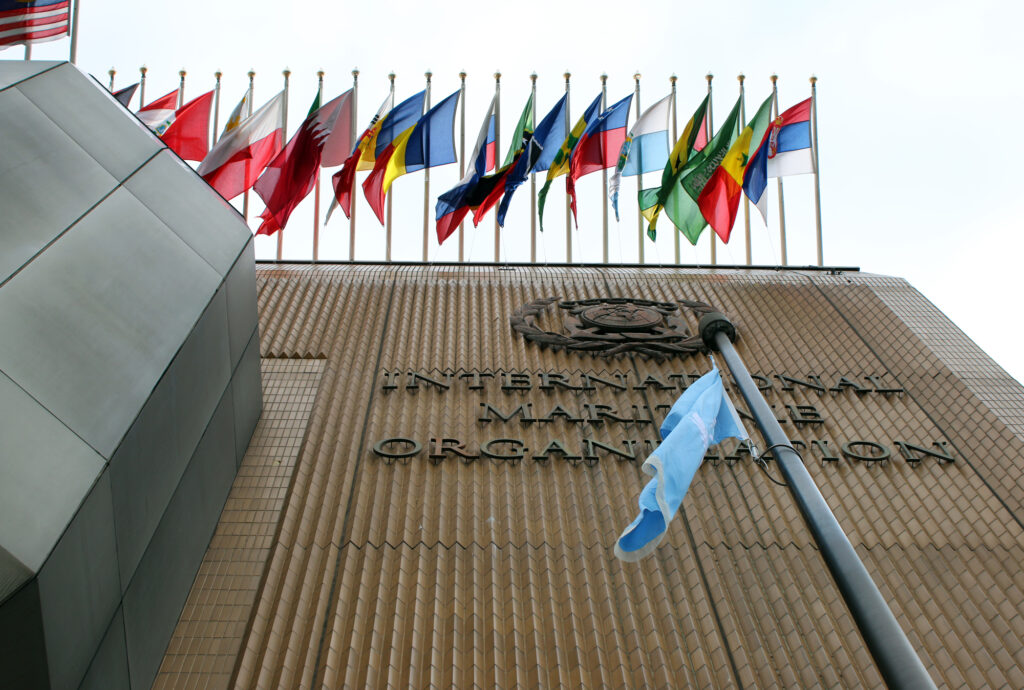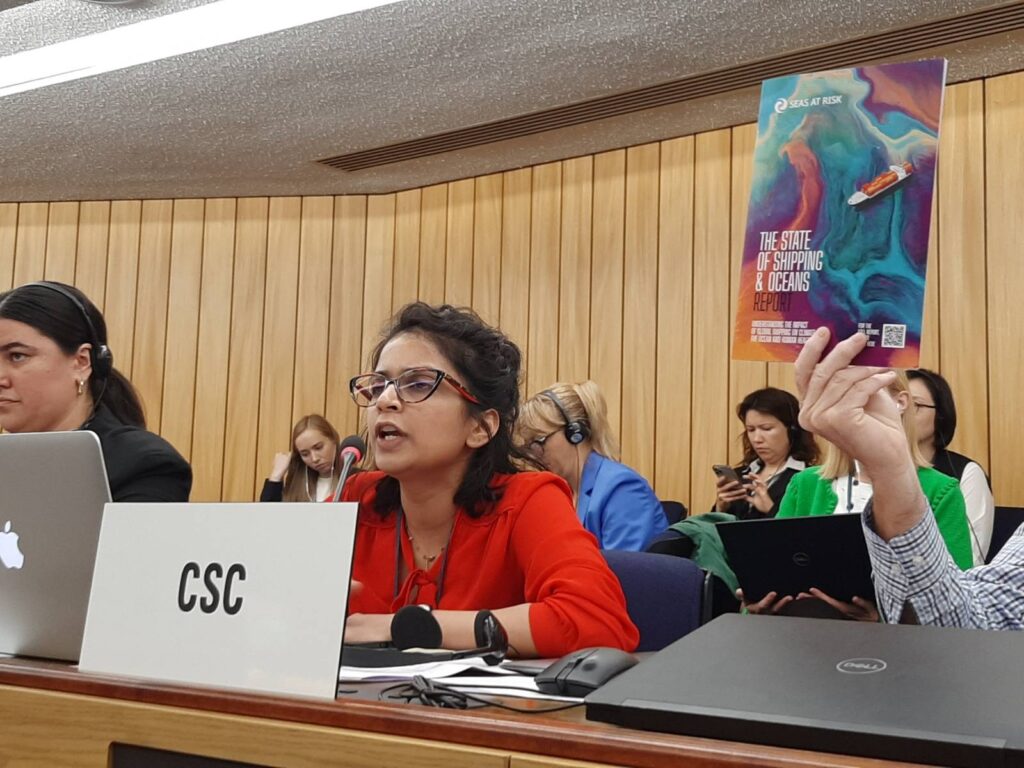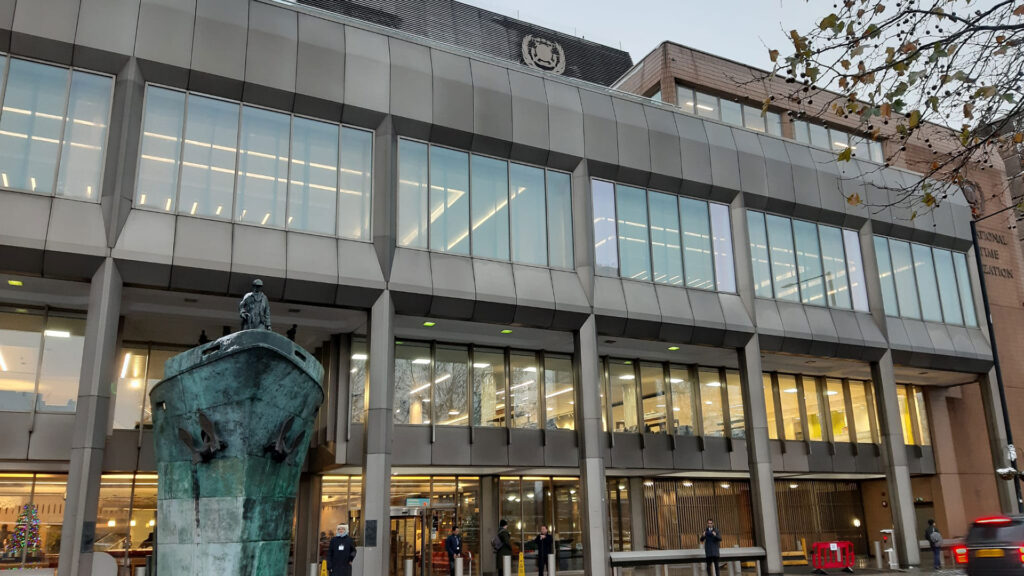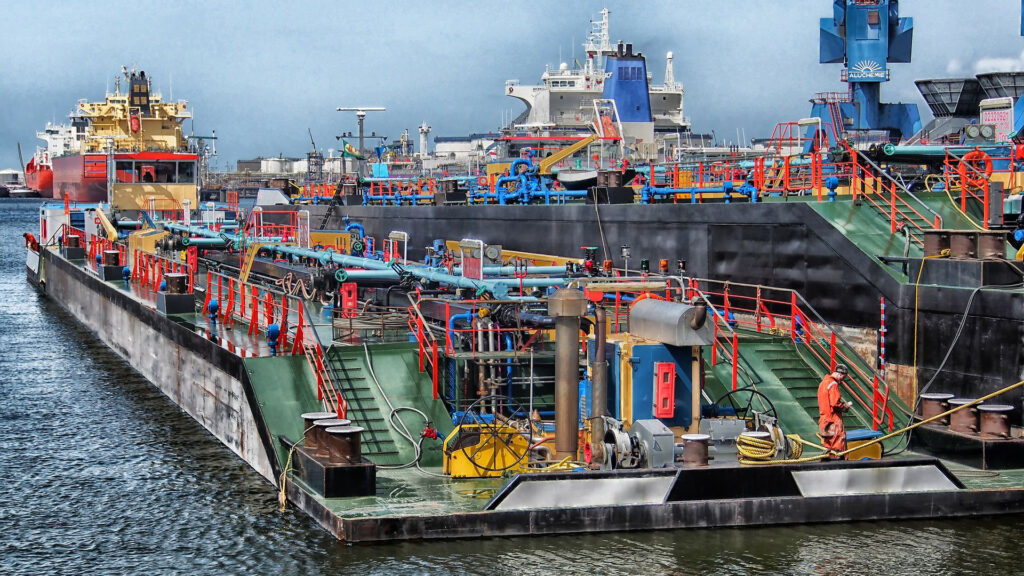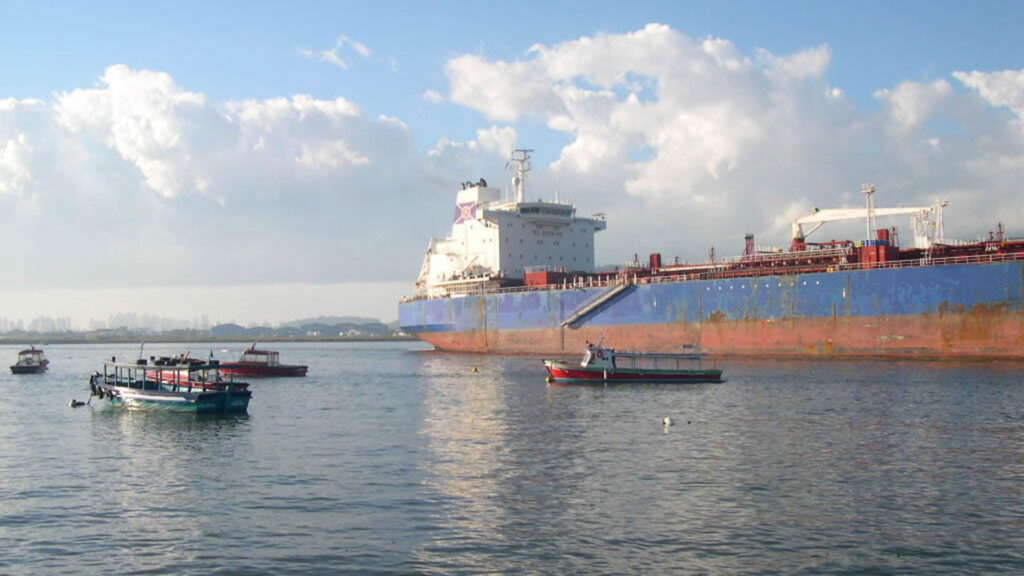London, 22 March, 2024:- As this week’s meeting of the International Maritime Organization’s Marine Environment Protection Committee (MEPC 81, March 18-22) winds down, the Clean Shipping Coalition welcomed the growing support for a greenhouse gas (GHG) emissions levy, but warned that IMO member states must also maintain focus on other key issues such as the global fuel standard (GFS) and the improvement of how energy is used in ships via the carbon intensity indicator (CII).
London, 22 March, 2024:- As this week’s meeting of the International Maritime Organization’s Marine Environment Protection Committee (MEPC 81, March 18-22) winds down, the Clean Shipping Coalition welcomed the growing support for a greenhouse gas (GHG) emissions levy, but warned that IMO member states must also maintain focus on other key issues such as the global fuel standard (GFS) and the improvement of how energy is used in ships via the carbon intensity indicator (CII).
The Clean Shipping Coalition is calling on the IMO to urgently step up ship climate action by improving its Carbon Intensity Indicator (CII), which would quantify and raise ship efficiency while fostering greater transparency and driving deep and lasting reductions in pollution.
The revision of the CII is a key opportunity to bring it up to date with the revised GHG Strategy and to make sure that it works in the future in a coherent way with the basket of mid-term measures (BoM) being negotiated at the same time.
During the International Maritime Organization’s Intersessional Working Group on Reduction of GHG Emissions from Ships (IMO, IWSG-GHG-16, March 11-15) the Clean Shipping Coalition presented the link between Global fuel standard and Carbon Intensity Index.
The Clean Shipping Coalition is calling on the IMO to take action on the Carbon Intensity Indicator, a global fuel standard, and a greenhouse gas emission levy.
The IMO has this week moved on climate change. But in the week that delivered us the world’s hottest day ever, for sure it hasn’t moved fast enough.
Civil society groups are deeply concerned by the UN’s International Maritime Organization (IMO) failure to firmly align global shipping with the Paris Agreement’s 1.5°C temperature-warming limit, at the 80th Marine Environment Protection Committee meeting (MEPC 80) this week.
Shaama Sandooyea, a marine biologist and climate activist from Mauritius, addressed delegates at the MEPC 80 climate summit in London on 4 July, on behalf of the Clean Shipping Coalition.
Global shipping continues to cause significant harm to the climate, the ocean and human health, with the United Nations International Maritime Organization (IMO), international community and maritime sector repeatedly failing to properly address the issues.
30 June 2023 – Civil society groups are deeply concerned about developments at the UN’s International Maritime Organization (IMO) climate negotiations this week (ISWG-GHG-15), in particular regarding the 2030 and 2040 climate targets that are necessary to put global shipping on a 1.5°C-aligned transition and ensure an equitable transition.
26 June 2023 – The global shipping industry can reduce emissions by nearly 50% by the end of the decade, according to a new study by CE Delft.
19 June 2023 – The International Maritime Organization’s (IMO) agreement on shipping climate targets expected next month could be the starting gun for the radical climate action our planet desperately needs.
The Clean Shipping Coalition (CSC) has written to the candidates for this summer’s election of a new International Maritime Organisation (IMO) Secretary General to see if they understand the urgency of the climate crisis and have the determination and strength of vision to be a transformational new leader of the IMO.
Clean Shipping Coalition and the Clean Arctic Alliance call on the IMO to radically reduce the impact of black carbon emissions from shipping on Arctic sea and glacier ice.
Next week is the much-anticipated tenth session of the International Maritime Organization (IMO) Pollution Prevention and Response Sub-Committee (PPR 10).
Countries must keep the pressure on the UN to commit to reducing emissions from global shipping before 2030, in the run up to a crucial climate summit at the International Maritime Organization (IMO) in July.
The Intergovernmental Panel on Climate Change (IPCC) has released its latest assessment of where humanity is at in dealing with climate change.
The International Maritime Organization (IMO) has a historic opportunity in the next three months to put the global shipping industry on an equitable, 1.5°C-aligned decarbonisation pathway.
The stage is set for the UN to finally call time on greenhouse gas emissions from international shipping, following a week of climate talks at the International Maritime Organization (IMO) in London.
This week at the United Nations International Maritime Organization (IMO), Seas At Risk as part of the Clean Shipping Coalition has been participating in the climate negotiations taking place within the Marine Environment Protection Committee (MEPC79).
This week’s round of technical talks at the UN’s maritime regulator showed countries are prepared to phase out shipping emissions by 2050.
More countries than ever before agree that the global shipping industry must step up action to tackle its impacts on the climate.
Countries must seize the momentum and turn their climate pledges into action at the International Maritime Organization (IMO), which is gathering next week for the 78th session of the Marine Environment Protection Committee (MEPC 78).
The outcome of this week’s climate talks at the UN’s shipping agency, the International Maritime Organization (IMO), is yet another blow to any efforts to start reducing greenhouse gas emissions from ocean shipping.
The International Maritime Organisation (IMO) stifled debate on the issue and ignored a now 80,000-signature petition demanding action gathered by the London-based Environmental Investigation Agency (EIA).
Delegates at the International Maritime Organization, MEPC77, are meeting on 22-27 November to discuss the plastic action plan to reduce the plastic footprint of ships.
Two weeks of talks in London on what measures the global shipping sector should take to reduce its climate impact have failed to make progress.
Today’s commitment by governments to require international shipping to decarbonise and at least halve its greenhouse gas emissions by 2050 is a welcome and potentially game changing development, the Clean Shipping Coalition (CSC) has said.
Moves to close a loophole in enforcement of the cap on high-sulphur marine fuel, which comes into effect in January 2020, have been welcomed by the Clean Shipping Coalition (CSC).
Leading environmental organisations and the global shipping industry have joined in calling for an explicit prohibition on the carriage of non-compliant marine fuels when the global 0.5% sulphur cap takes effect in 2020.
The Clean Shipping Coalition (CSC), a group of NGOs with observer status at the UN’s International Maritime Organisation (IMO), have heavily criticised comments by the head of the IMO warning the EU against taking action to address increasing GHG emissions from ships.
The European Parliament today called on EU governments to align the 2030 EU climate target with the Paris Agreement and introduce EU measures to cut emissions from aviation and shipping.
Statement by the Clean Shipping Coalition in response to recent statement by the Secretary General of the IMO on the subject of shipping and climate change.
The gripping Solar Impulse flight, and the news that Airbus has patented a plane that can fly from Paris to Tokyo in under 3 hours, shows that the aviation industry remains one of the few industries that can ignite our imagination with new ideas.
Regrettably the IMO decided today that business as usual is more important than agreeing that international shipping must make its fair contribution to combatting climate change.
A new CE Delft study has revealed that many recently constructed ships already meet the International Maritime Organisation’s design efficiency standard for 2020, indicating that there is significant room for tightening these standards when the IMO meets next week.
New ships built in 2013 were on average 10% less fuel-efficient than those built in 1990, according to a new study.
The Clean Shipping Coalition (CSC) is calling on shipping industry leaders to support a carbon emissions reduction target for their sector, as ship owners and stakeholders gather in Brussels for European Shipping Week.
The coming months represent an opportunity for a dialogue between parties on why this wording should be included in the Paris Agreement at COP 21.
In the final years of negotiations for the new climate agreement, it’s still not clear if it will include the fastest growing emissions sources — international aviation and shipping, also known as bunker fuels.
The latest round of climate talks concluded in Lima last month with a sense that some of the basics have been agreed to set the foundations of a global agreement in Paris next year.
The decision at the International Maritime Organisation (IMO) to recommend to its environment committee a definition of black carbon arrived at by scientific consensus, after four years of debate, has been welcomed by environmental NGO Transport & Environment.
For the first time, all shipping companies calling at EU ports will have to measure and publicly report carbon emissions under a law approved by an overwhelming majority of the European Parliament’s Environment Committee today.
Our huge level of consumption and the accompanying waste it creates is leading to terrifying amounts of plastic entering our seas.
The International Maritime Organisation (IMO) today abandoned the fixed start date for new NOx emissions control areas (NECAs), which require an 80% cut in NOx from new ships sailing in specially designated zones.
The European Parliament’s Environment Committee voted overwhelmingly today to support and strengthen some elements of the Commission’s proposal for monitoring, reporting and verification (MRV) of shipping emissions.
Advanced emissions monitoring of large ships calling at EU ports could help save owners and operators of large ships up to €9 million/year, according to a new study published by environmental NGOs Transport & Environment and Seas at Risk.
The International Maritime Organisation (IMO) today decided to postpone the entry into force of nitrogen oxide (NOx) emissions limits for ship engines from 2016 to 2021.
Why little things matter? Minuscule particles in the air, called soot, cause more than 300,000 deaths a year in Europe alone. If we don’t reduce soot emissions now, in 40 years time the North Pole will be under water.
Shipping activities are set to increase as the melting of Arctic ice accelerates. This will lead to increased emissions which will exacerbate Arctic melting and pose a growing threat to the environment in the region.
Environmental groups have today welcomed a European Parliament vote which will help cut back air pollution by significantly decreasing the amount of dirty sulphur allowed in marine fuels.
The EU has boosted efforts to remove one of the main sources of air pollution and acid rain from shipping.
Speed controls on shipping could save billions in lower ship fuel bills, cut air pollution and enable the shipping industry to play a full part in tackling climate change, according to a new report.
The polar waters of the Arctic and Antarctic are in jeopardy as a result of substantial delays to the development of environmental protection rules which will reduce the impact of shipping on these delicate regions.
The Clean Shipping Coalition welcomes the adoption by the International Maritime Organisation (IMO) of an Energy Efficiency Design Index (EEDI) regulation for new ships, but warns that it’s only the first step in what needs to be a far more expansive effort to address shipping’s climate impacts.
The International Maritime Organisation (IMO) failed to reach agreement on global action to address greenhouse gas emissions from international shipping at a meeting in London last week.
The first global agreement to cut carbon emissions from ships has been blocked by several developing countries.
Environmental NGOs have welcomed last Thursday’s decision by the International Maritime Organisation (IMO) to require substantial reductions in the sulphur content of marine fuel from 2020.
